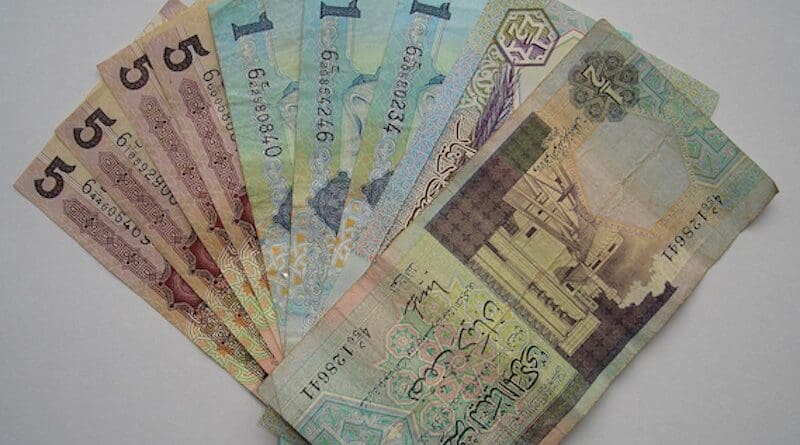Economic Crisis Grips Libya: Delayed Salaries, Declining Exchange Rate, And Financial Strain – OpEd
Libya is currently facing a shortage of money in banks, causing concern among citizens who are experiencing delayed salaries and the increasing price of the dollar compared to the dinar.
The economic crisis was triggered by armed clashes in the city as armed militias fought for control over a strategic port. This resulted in ships loaded with goods being unable to unload near Tripoli’s international port, leading to food market instability and some goods disappearing from shelves. Shipping operations were severely limited, with oil tankers congested near the port due to oil facility closures.
As the month of Ramadan approaches, a time typically marked by increased purchases and market activity, residents of Benghazi are expressing frustration over high food prices and salary delays. The official exchange rate for the dollar has reached 4.80 dinars, while on the parallel market (black market) it stands at 7.39 dinars.
Libya is currently facing various economic challenges that are causing difficulties for its citizens. Financial problems are on the rise, and their impact is clearly visible in people’s daily lives. One of the most significant challenges is the delay in salary payments, which many employees are struggling with. This directly affects their purchasing power, making their financial situation even more challenging. This issue puts citizens in a tough spot as they struggle to meet their basic needs and prepare for the upcoming month of fasting.
Additionally, the local currency exchange rate is rapidly declining, exacerbating the problem of liquidity shortages in the market. This economic downturn is limiting citizens’ access to cash and adding to the financial challenges they are already facing.
The crisis is mainly caused by the current lack of liquidity, resulting from inconsistent and unpredictable decisions made by the Central Bank of Libya. This has eroded trust between the bank, citizens, and merchants, as well as hindered investments and money flow.
Citizens are withdrawing money immediately, and merchants are hesitant to deposit their funds in banks, leading to inflation. The absence of legal regulations to hold Central Bank officials accountable further complicates the situation. The Governor of the Central Bank of Libya is now working on creating a unified national budget amidst the declining value of the Libyan dinar to ensure the state’s financial sustainability.
Despite the World Bank’s initial expectations for the Libyan economy to recover in 2023 after a decade of obstacles, recent events such as floods, the Gaza war, and political instability have worsened the economic situation in the country. This has put greater pressure on the state’s resources.
In Libya, the economic situation is presenting significant challenges for the Libyan people. These challenges include the rising prices of basic commodities such as flour, oil, and sugar, as well as increasing fuel prices that impact mobility and daily life. The increased consumption and inflation are affecting the purchasing power of the Libyan dinar.
The repeated delays in disbursing salaries are adding pressure on families. Additionally, there is a shortage of cash in commercial banks and fuel in most western and southern cities, making it nearly impossible to make purchases.
According to the World Bank, unemployment rates in Libya have reached 19.6 percent, with over 85 percent of the economically active population working in the public sector and informal economy. Libya heavily relies on importing food supplies, and with the rise in the dollar exchange rate, the Libyan dinar is experiencing a significant decline in the parallel currency market, reaching approximately 7.34 against the dollar, while the official rate remains at 4.85. The increased consumption and high demand are leading to price hikes, which could result in higher inflation rates, highlighting the need for the Libyan national unity government to enforce judicial control over violators before Ramadan.
Given these economic challenges, Libyans are uncertain about their financial future and their ability to afford basic necessities. It is crucial for political and economic leaders to implement effective measures to address these challenges and provide sustainable solutions that promote economic stability and alleviate the burden on citizens.
There are three basic indicators related to the economic situation in the Libyan market. The first indicator is the economic growth rate, which remains stable due to oil production rates of about 1.2 million barrels per day, assuming there are no new closures for political reasons. The second indicator is the general rise in prices, which are stable, but there is a decrease in liquidity in the banks due to technical procedures, including clearing operations between the East and the West, as well as technical problems with printed currencies. The third indicator is the abundance of the basic basket of goods, which was previously affected by documentary credits from banks. The balance of payments still faces challenges due to the fuel subsidy file, and the national unity government is expected to address this issue. The government’s fuel subsidy bill amounts to approximately 74 billion Libyan dinars.
To help the economy recover, Libya can leverage its large financial resources by reaching a sustainable political agreement on the country’s future. This involves preparing a joint vision for economic and social development, translating it into a national financial budget to maintain infrastructure, developing an accountable and transparent public finance management system, ensuring fair distribution of oil wealth and government financial transfers, effective budget planning and implementation, and improving reporting on these efforts. Comprehensive social policy reform is needed to differentiate between social transfers to the needy and public wages.

